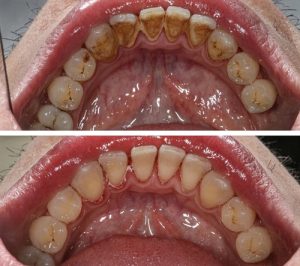Achieve Optimal Oral Health with Scaling & Root Planing in Kingwood, TX
Are you struggling with gum disease or looking to improve your dental health? Our Kingwood, TX dentist, Dr. Derek Scott offers scaling and root planing as a highly effective procedure designed to clean below the gumline, remove plaque and tartar, and keep your gums healthy. This deep-cleaning technique can help prevent further oral health issues and restore your smile.
Don’t let gum disease hold you back—schedule a consultation with your Kingwood dentist today by calling (281) 358-3125 to see if scaling and root planing is right for you. Your path to a healthier, more confident smile starts now!
What Is Scaling and Root Planing?
 Root planing periodontal scaling, also known as a deep cleaning, is a non-surgical procedure used to treat periodontal disease. It involves the removal of plaque and tartar that’s built up below the gum line and smoothes out the tooth root to prevent further bacterial growth. The scaling and root planing processes are performed together to improve oral health and prevent gum disease from progressing.
Root planing periodontal scaling, also known as a deep cleaning, is a non-surgical procedure used to treat periodontal disease. It involves the removal of plaque and tartar that’s built up below the gum line and smoothes out the tooth root to prevent further bacterial growth. The scaling and root planing processes are performed together to improve oral health and prevent gum disease from progressing.
- Scaling: Your Kingwood dental hygienist uses a hand instrument or ultrasonic device to remove plaque and tartar from the crowns of the teeth and below the gum line.
- Root planing: They’ll use a smooth instrument to smooth the root surfaces of the teeth. This helps the gums reattach to the teeth.
Benefits of Scaling & Root Planing
For those showing signs of early-stage gum disease, scaling and root planing can provide you with the following benefits:
- Prevents gum disease from progressing into periodontitis
- Reduces the risk of tooth loss
- Eliminates bad breath
- Improves overall oral health
- Can save you money on future dental treatments
- Decreases gum bleeding
- Helps treat gum disease by removing plaque and tartar, allowing the gums to regain health
When Is Scaling and Root Planing Necessary?
Scaling and root planing are necessary when there’s an excessive build-up of plaque and tartar that has caused gum inflammation, bleeding, and even bone loss. A deep cleaning may be recommended if:
- There’s moderate to severe gum disease, also known as periodontitis, or chronic periodontal disease.
- There’s a significant amount of plaque and tartar buildup on the teeth and gums.
- There’s bleeding, inflammation, and recession of the gums.
- When there are deep pockets between the teeth and gums that have formed due to gum disease.
- When some loose teeth or teeth have shifted due to gum disease.
How the Scaling and Root Planing Processes Work
 The scaling and root planing procedure can be completed through the following steps:
The scaling and root planing procedure can be completed through the following steps:
- Evaluation: Your Kingwood dentist will evaluate the extent of gum disease through dental X-rays and measurements of the gum pockets.
- Local Anesthetic: We’ll use a local anesthetic, or another form of dental sedation, to numb the area before starting the procedure. This helps minimize discomfort or pain during the process.
- Scaling: Dr. Scott will use special tools to remove the plaque and tartar from the tooth surfaces and below the gum line. This is also known as dental scaling.
- Root Planing: The tooth root can become rough due to uneven plaque and tartar buildup. Dr. Scott will smooth out the rough surfaces of the tooth root to prevent further bacterial growth and encourage the gums to reattach to the teeth.
- Antibacterial Rinse: An antibacterial rinse will be given to you to help flush out any remaining bacteria.
Scaling and Root Planing Aftercare
After your scaling and root planing procedure, you’ll want to take care of your oral health to ensure the gum disease doesn’t come back. Dr. Scott may recommend doing the following:
- Follow a good oral hygiene routine, including brushing twice a day and flossing daily.
- Use an antibacterial mouthwash as prescribed by your dentist.
- Avoid eating hard, crunchy, or sticky foods for a few days.
- Attend regular dental checkups to monitor your oral health and schedule follow-up dental visits as needed to ensure proper healing and management of chronic periodontal disease.
Frequently Asked Questions
No, the scaling and root planing procedure is generally painless. Your dentist will use a local anesthetic, or another form of dental sedation depending on your needs, to numb the area and minimize any discomfort.
The duration of the procedure depends on the condition of your oral health, but it usually takes one to two hours and multiple sessions. Your dentist will examine the condition of your oral health and will provide an estimated timeline. Depending on the progression of your periodontal disease, it may take more than one scaling and root planing appointment to reverse its effects. Chronic periodontal disease occurs when bacteria in plaque cause pockets to form between the teeth and gums, necessitating multiple sessions to address these harmful effects.
Treat chronic periodontal disease with scaling and root planing, which can help to manage the condition, but it’s not a cure. It’s essential to maintain good oral hygiene and keep up with regular dental visits to reduce the risk of periodontal disease recurrence.
Many dental insurance plans cover the cost of scaling and root planing, but it’s best to check with your provider to confirm your coverage. If the coverage isn’t enough, ask your dentist if their office provides special discounts or financing options.
Take the First Step Towards Healthier Gums Today
Scaling and root planing is more than just a dental procedure—it’s a commitment to long-term oral health. By addressing plaque and tartar buildup effectively, you can prevent serious gum issues and enjoy a brighter, healthier smile. Don’t wait for gum disease to impact your well-being—contact Dr. Scott to discuss how scaling and root planing can benefit you. If you suspect you have gum disease, seek prompt treatment from our dentist. Early treatment is crucial to avoid more invasive procedures like periodontal surgery. Schedule a consultation at our Kingwood, TX dental office by calling (281) 358-3125.